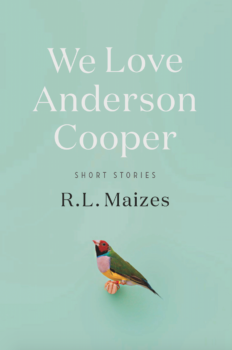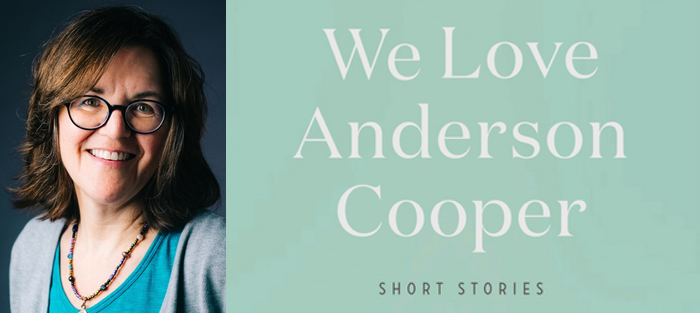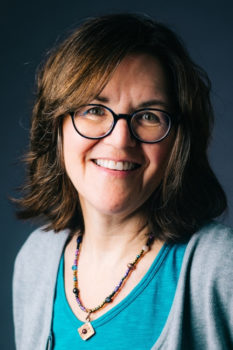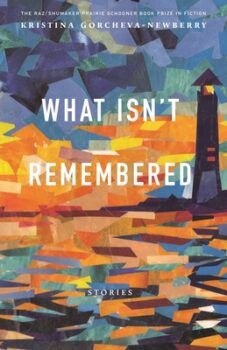R.L. Maizes’s debut collection, We Love Anderson Cooper, will be published in July by Celadon Books, a division of Macmillan Publishing. In an interview with her publisher, Maizes has indicated that she purposefully chose stories about outsiders for the collection, “because it’s a theme most people can relate to,” noting that “we’ve all been outsiders at one time or another.” And part of our reading pleasure comes from finding aspects of ourselves in these characters, no matter how quirky their appearance, neuroses, or beliefs. Herein we find a young gay Jewish man preparing for his bar mitzvah, a tattoo artist whose facial stains lead to a metaphysical passion for his craft, a Jewish man struggling to accommodate his Christian partner. Yet despite how the lives of these characters may or may not intersect with our own, Maizes portrays their experiences with thoughtfulness and compassion, crafting a collection that is by turn thoughtful, funny, and poignant. The book has received a starred review from Kirkus, which notes that the “gently witty and vaguely weird collection is well worth reading.”
A former lawyer, R.L. Maizes hails from Queens, New York, and now lives in Boulder County, Colorado. Her writing has been published in Electric Literature, Witness, Bellevue Literary Review, The New York Times, The Washington Post, and elsewhere, as well as having been aired on National Public Radio. Her work has received an Honorable Mention in the Glimmer Train Fiction Open contest and has been nominated for a Pushcart Prize, as well as having received recognition in numerous other national contests. Her novel, Other People’s Pets, will be out July 2020 from Celadon Books.
Interview:
Donna Baier Stein: Most writers, at least in the early stages of their careers, juggle other jobs. Which jobs have you held, and have they helped or hindered your writing? I think I saw on social media that you write six days a week. Tell us more about your daily life as a writer. What’s an ideal day for you?
R.L. Maizes: I was a lawyer for many years. As a lawyer, you learn people’s secrets. Sometimes you learn them at the outset of the representation and other times clients slip and you find out things they intended to hide even from you. While I haven’t written about clients, having a window into the hidden side of human behavior is helpful for a writer whose raw material is human nature. Another way that being a lawyer was helpful is that legal work is hard. It prepared me to face challenges as a writer, in the actual craft of writing and on the business side of things.
Once I decided to pursue writing, I began to write almost every evening after work and on weekends. That discipline is the reason I was able to improve. Since I stopped practicing law, I now write all morning. If you write first thing, you reduce the risks of finding yourself too tired at the end of the day, or of other priorities interfering with writing. I take a break for lunch and to walk the dog. While walking, I think about places in my work where I’m stuck. There’s something about walking that nearly always helps me discover solutions. Then, I write for another hour or two in the afternoon. I feel very fortunate to be able to write full time. I know few people have that opportunity, and I feel compelled to make the most of it.
As soon as my head hits the pillow at night, I invariably get another burst of creativity, which is a mixed blessing because I’m usually pretty tired. But I love that ideas begin to flow, almost always relating to whatever I worked on that day. I send myself half a dozen emails or more so I don’t forget the ideas. The few times I haven’t sent the emails because I thought I would remember the ideas, I’ve always forgotten them.
Any books you remember particularly fondly from childhood or high school years? What were your reading habits when you were young?
I was raised as an Orthodox Jew—though I’m no longer religious—and we didn’t turn lights on or off, drive, or watch television on the Sabbath. There was absolutely nothing to do other than read, and as a result I became a voracious reader. (Often in the bathtub, because one of the only lights that was on during the Sabbath was in the bathroom.) I loved the Pippi Longstocking books, the humor and how rebellious she is. I read Little Women over and over, and later, Agatha Christie mysteries. I loved Jewish books that reflected my experiences: Chaim Potok’s The Chosen, The Promise, and My Name is Asher Lev. As I got older, the work of J.D. Salinger and Kurt Vonnegut introduced me to satire. When I was in high school, my older sisters passed down a forbidden paperback in which all the sex scenes were dog-eared. I read that a lot although I can’t remember the title and maybe reading isn’t the right word.
As far as my reading today, it tends toward literary fiction. Recently, I read Susan Perabo’s collections Why They Run the Way They Do and Who I Was Supposed To Be, and found them hilarious and moving. I’m reading Micah Perk’s novel, What Becomes Us, and really enjoying it. I like quirky characters and unusual set-ups. One of the Perabo stories is told from the point of view of Alfred, Batman’s butler. It’s a short, funny story that is extremely revealing. Those are the kinds of stories I love.
Speaking of stories, tell us about the origins of We Love Anderson Cooper. What were some of the first stories you wrote that appear in the book?
 One of the oldest stories in the collection is “Couch.” It’s about a therapist who’s stuck and who keeps her clients stuck. I wrote it about ten years ago and revised it for the collection. My mother was a therapist and the story was inspired by her therapy couch, which I inherited after she died. I imagined it made people weep as soon as they sat on it. The story was also inspired by the many therapists—good and bad—I’ve had over the years. I hope they all buy a copy of the book. That alone would give me a bump in sales.
One of the oldest stories in the collection is “Couch.” It’s about a therapist who’s stuck and who keeps her clients stuck. I wrote it about ten years ago and revised it for the collection. My mother was a therapist and the story was inspired by her therapy couch, which I inherited after she died. I imagined it made people weep as soon as they sat on it. The story was also inspired by the many therapists—good and bad—I’ve had over the years. I hope they all buy a copy of the book. That alone would give me a bump in sales.
Can you tell us a bit more about some of the primary themes in the collection? What personal obsessions or preoccupations came to light as you were writing these stories?
The collection is first of all about people who are dealing with the challenges of being outsiders and the toll being an outsider takes. Growing up as an Orthodox Jewish woman, I was an outsider in the larger society in which Christianity is established as the norm. We celebrated different holidays, ate different foods, and were sometimes on the receiving end of antisemitism. I was also kept on the margins within the religious community, which was terribly sexist. Though I am no longer religious, those experiences gave me a preoccupation with outsiders of all kinds, with the experience of being the other. They also made me a feminist. Several stories in the collection examine how women fare in relationships with men. Another theme that runs through the collection is loss—of life, of innocence, and of love.
How long did it take to write the stories that the collection comprises, and how did you work on developing your craft during that time?
I wrote the stories in the book over a ten-year period. The last story I wrote was the title story, “We Love Anderson Cooper.”
Something I did early on, long before I wrote the collection, was to join a writing group. One of the members of that group had an MFA, which I don’t, and she was a more advanced writer than I was. Her critiques of my stories were invaluable and so was her encouragement, maybe the encouragement most of all, because it kept me going through long periods when it seemed I’d never become the writer I wanted to be. When I look back at the stories I was writing then, stories before “Couch,” I’m not sure how much encouragement I deserved. I was a beginner and some of the stories I was writing were really bad. They were sanctimonious and sensationalist. I remember one ended with acid being poured over a villain’s hands.
Another way I developed my craft was to take a lot of writing workshops. Every summer, Lighthouse Writers Workshop in Denver brings in teachers such as Rebecca Makkai, Antonya Nelson, and Steve Almond. Studying with writers of that caliber, I always came away with at least one new tool that had a significant impact on my work.
The most important thing I did to improve was to study one-on-one with writers whose work I admired. Some of these writers called themselves writing coaches, others called themselves developmental editors, but regardless of the name, they gave me in-depth critiques of my stories and novel through multiple drafts. They became mentors I could approach with questions about craft and, when the time came, with questions about publishing. I couldn’t have written the collection or my novel without their feedback.
Many of the characters in the collection are defined by their wounds, flaws, or differences, as well as the way they succumb to or engage these challenges. Could you talk about the challenges you faced in creating these particular characters, or describing people unlike yourself?
We all carry wounds. So when I’m writing, I can draw on experiences I’ve had and experiences of those close to me to help me relate to characters who are very different from me but who also carry wounds. Also, as a writer, part of my job is to use imagination and empathy to conjure lives different from my own. In the story “Tattoo,” for example, an artist is shunned because of the giant moles on his face. His relationship to art is affected by his appearance. I don’t have giant moles, but having grown up as an Orthodox Jew, I know what it’s like to be different and to stand out. I’ve had the experience of being ridiculed, as probably many of us at one point or another have had. In “We Love Anderson Cooper,” a boy comes out at his bar mitzvah. While I have attended many, many bar mitzvahs, I’ve never come out at one, nor have I attended one where someone came out. But I am very close to several people who have come out under other circumstances. I gave the story to them while I was drafting it to make sure that it read true. So that’s another way to handle describing people unlike yourself. Do research, just as you would in describing anything with which you don’t have first-hand experience. Run the work by the people whose lives you’re describing to make sure you get it right.
At what point did you think you might be working on a collection rather than simply writing stories? And can you tell us about your journey querying agents and landing a publisher?
After I placed a story on NPR and in literary journals such as Electric Literature and Witness, I thought I might be able to sell a collection. I queried agents who had sold collections and those who hadn’t. On a Friday, I received three rejections from agents who had read the full manuscript. One said I’d never get an agent because collections were too hard to sell. That was a low point. But I knew from reading collections and from following sales in Publishers Marketplace that agents did represent collections and that they sold regularly. Not as often as thrillers or literary novels, but regularly. Ultimately, I went with an agent who hadn’t sold a collection because I could tell she would be a fantastic champion for the book. Maybe it helped that she didn’t have any preconceived ideas about the difficulty of selling the book. She notified me on a Friday that she had submitted the book to publishers, and three of those publishers expressed interest in acquiring it the following Monday.
What is some of the best advice about writing that you’ve received from mentors over the years?
I took a weeklong workshop at Lighthouse Writers Workshop in Denver with Rebecca Makkai. She said when you’re writing, you should never stop at your first thought, but always go deeper to something more original. That piece of advice has had a profound effect on my work. Another teacher of mine once said he couldn’t think of any student who stuck with writing over the years, working at it and honing her craft, who didn’t find success. I love this because it shows that writing is not an inborn talent that either you have or you don’t. Instead, writing is a skill that you develop over time with great effort.
How do you hope your writing might be of service in the world?
The best writing is transformative. You can’t read Rebecca Makkai’s The Great Believers and not have it affect your feelings about love and loss. You can’t read Adam Haslett’s Imagine Me Gone and not have your feelings about mental illness change. Writing succeeds, too, when it acts as a mirror, reflecting our humanity back to us. The characters in We Love Anderson Cooper are outsiders because of their religion, gender, race, sexual orientation, or for some other reason. I hope the book inspires readers to have empathy for those who suffer because they’re different. I hope it encourages readers to be kind to themselves when they don’t quite fit in. I’d be happy if it helps people see beyond their differences. But if the stories illuminate some aspect of our humanity and in doing so make readers laugh or break their hearts a little, that would satisfy me, too.







